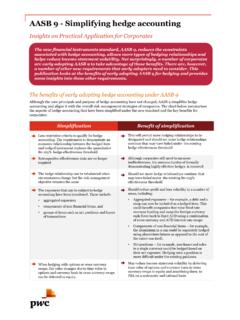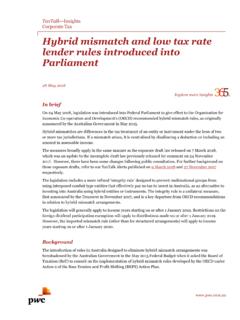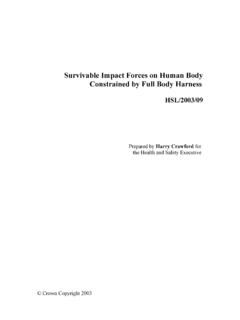Transcription of Interpretation boilerplate - PwC
1 Investing in Infrastructure | International Best Practice in Project and Construction Agreements | January 2016 Interpretation boilerplate Interpretation boilerplate Need to know An Interpretation clause is used to express the rules which the parties wish to apply to the Interpretation of their deed or agreement. The sample Interpretation clause provided below is a standard boilerplate Interpretation clause containing rules of Interpretation that are fairly typical of those in most commercial contracts. However, certain options must be selected or adjustments made in each case. These are explained further below. Sample clause Interpretation In this [deed/agreement] the following rules of Interpretation apply unless the contrary intention appears: (a) headings are for convenience only and do not affect the Interpretation of this [deed/agreement] (b) the singular includes the plural and vice versa (c) words that are gender neutral or gender specific include each gender (d) where a word or phrase is given a particular meaning, other parts of speech and grammatical forms of that word or phrase have corresponding meanings (e) the words such as , including , particularly and similar expressions are not used as, nor are intended to be interpreted as, words of limitation (f) a reference to.
2 (i) a person includes a natural person, partnership, joint venture, government agency, association, corporation, trust or other body corporate (ii) a party includes its agents, successors and permitted assigns (iii) a document includes all amendments or supplements to that document (iv) a clause, term, party, schedule or attachment is a reference to a clause or term of, or party, schedule or attachment to this [deed/agreement] (v) this [deed/agreement] includes all schedules and attachments to it (vi) a law includes a constitutional provision, treaty, decree, convention, statute, regulation, ordinance, by-law, judgment, rule of common law or equity [or a rule of an applicable Financial Market] and is a reference to that law as amended, consolidated or replaced (vii) a statute includes any regulation, ordinance, by-law or other subordinate legislation made under it (viii) an agreement other than this [deed/agreement] includes an undertaking, or legally enforceable arrangement or understanding whether or not in writing (ix) a monetary amount is in Australian dollars and all amounts payable under or in connection with this [deed/agreement] are payable in Australian dollars (g) an agreement on the part of two or more persons binds them [jointly and not severally/severally and not jointly/jointly and each of them severally] (h) no rule of construction applies to the disadvantage of a party because that party was responsible for the preparation of this [deed/agreement] or any part of it (i) when the day on which something must be done is not a Business Day, that thing must be done on the [following/preceding] Business Day (j) in determining the time of day where relevant to this [deed/agreement], the relevant time of day is.
3 (i) for the purposes of giving or receiving notices, the time of day where a party receiving a notice is located (ii) for any other purpose under this [deed/agreement], the time of day in the place where the party required to perform an obligation is located (k) a day is the period of time commencing at midnight and ending immediately before the next midnight is to occur [and] PwC 3 Interpretation boilerplate (i) if a period of time is calculated from a particular day, act or event (such as the giving of a notice), it is to be calculated exclusive of that day, or the day of that act or event [and/] [Optional] (m) If there is any conflict between the body of this [deed/agreement] and its schedules [and/or] attachments [or] [specify any related documents eg Statement of Work, special conditions, specifications etc], [the terms of the main body of this [deed/agreement] will prevail/the schedules or attachments will prevail in the following order: [specify order] 1 What is this clause and why is it used?]
4 Most commercial contracts include an Interpretation clause that sets out the rules of construction that the parties intend to apply to the contract . The clause can often be the place to look for significant concepts in a legal While there is temptation to simply cut and paste, the provisions of this clause are often material to the contract . Hidden issues may arise if this clause is not properly reviewed. The purpose of this clause is generally: to provide certainty of understanding when interpreting the contract , to avoid a court interpreting the contract in a way that is inconsistent with the parties' intentions to avoid repetition of information when drafting a contract , making it easier to Interpretation clauses in commercial contracts tend to be reasonably standardised, although important choices need to be made within parts of the clause in each particular case (these are discussed in section 3 below). Each firm will have their own version but the content, wording and topics addressed are often similar.
5 Interpretation clauses are not often the subject of negotiation and are ordinarily less tailor-made than other clauses that relate to the core of the The sample Interpretation clause is a standard " boilerplate " clause; that is, it is a clause of the type that will ordinarily be inserted into most commercial contracts with minimal alteration other than selecting appropriate options where the clause provides for this. The rules of Interpretation contained in the sample clause are fairly typical of those in most commercial contracts. However, the Interpretation clause should be read together with the draft contract before finalisation to ensure that the contract has been drafted in accordance with the rules contained in that clause, and to ensure that its application does not cause any part of the contract to have an ambiguous or unintended meaning. Areas of particular consideration are set out in section 3 below. 2 Using the sample Interpretation clause What does the sample Interpretation clause do?
6 In summary, the sample Interpretation clause operates by: (a) expressly stating how the parties intend particular grammatical conventions (adopted in the document) should be interpreted. For example, an Interpretation provision which states that "the singular includes the plural and vice versa" avoids the need to draft the document by including references to both singular and plural versions of each noun; (b) by setting out the breadth with which particular concepts are intended to be treated by the parties. For example, the inclusion of the phrase "a document includes all amendments or supplements to that document" obviates the requirement to state this repeatedly throughout the document (or to repeat such a rider in the definitions section for every defined document); and 1 Springrange Pty Ltd v Australian Capital Territory & ACT Planning and Land Authority [2010] ACTCA 17 at [29]. 2 cf AIB Group (UK) Ltd v Martin [2002] 1 All ER 353 at [8] per Lord Millett.
7 3 Fontaine M and De Ly F, Drafting International Contracts, an analysis of contract clauses, Koninklijke Brill, the Netherlands, 2009. PwC 4 Interpretation boilerplate (c) by altering, confirming or clarifying certain common law construction principles which might apply to the Interpretation of the contract , and seeks to achieve a level of certainty among the parties about the rules which a court should apply when interpreting the contract . For example, the inclusion of the phrase, "no rule of construction applies to the disadvantage of a party because that party was responsible for the preparation of this [deed/agreement] or any part of it", excludes the contra proferentem rule (ie that in the event of ambiguity, a contract , or clause in a contract , should be construed against the draftsman or interests of the party who provided the wording). How effective is it?
8 Parties may include their own Interpretation rules in a contract which courts will give effect to when construing the contract . 4 Contracting out of the common law rules of Interpretation is also permissible provided clear words are A limitation on the effectiveness of the sample Interpretation clause is that it is expressed only to apply "unless the contrary intention appears". Accordingly, if the contract is drafted in such a way that it appears that the parties intended a provision to be interpreted in a way that is inconsistent with the Interpretation clause, then that Interpretation will prevail. 6 You should consider this limitation when drafting a contract . Should I always include it, and what happens if I don't? If this clause or parts of it are not included, the parties may not obtain the benefits described above. In practice, nearly all sample deeds or agreements will include an Interpretation clause in substantially the same form as the boilerplate clause.
9 If not, a court will simply interpret the contract without the benefits described above. 3 Drafting and reviewing the clause Dratting notes for each particular sub-clause of the sample Interpretation clause are set out below. (a) headings are for convenience only and do not affect the Interpretation of this [deed/agreement] Sub-clause (a) provides that headings are not to be used for the Interpretation of the Headings are often used in contracts to summarise provisions and to assist with finding clauses and navigation generally (such as by using a table of contents).8 This sub-clause negates the common law principle of construction that catchwords or identifiers inserted for convenience (including headings) may be given due weight, although cannot prevail over the express words of a clause or create ambiguity where none otherwise The effect of this sub-clause is to give no weight to headings when interpreting the contract .
10 4 An objective approach is adopted in determining the rights and liabilities of parties to a contract . The meaning of the terms of a commercial contract is to be determined by what a reasonable businessperson would have understood those terms to mean: see the authorities set out in Electricity Generation Corporation v Woodside Energy Ltd [2014] HCA 7 at [35]. Most of the cases noted in this paper are examples of a court applying this process by giving effect to an Interpretation clause. 5 Cody v J H Nelson Pty Ltd [1947] HCA 17; (1947) 74 CLR 629 per Starke J citing Thorman v Dowgate Steamship Company Ltd [1910] 1 KB 410; cf contracting out of the provisions of a statute which is generally not effective, even in the absence of an express statutory prohibition on such an agreement (Caltex Oil (Australia) Pty Ltd v Best (1990) 170 CLR 516 at 521-522). Courts will give effect to the principle that it is not permissible to do indirectly what it prohibited directly, and will not permit the use of contractual devices to avoid statutory obligations (Bank of NSW v Commonwealth (1948) 76 CLR 1 at 349-350).
















